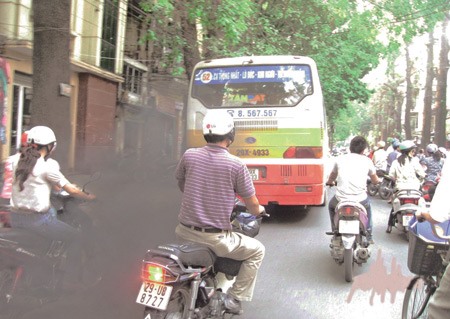 Society
Society

The Ministry of Transport plans to tighten emission control of automobiles to curb air pollution, Giao thông (Transport) newspaper reported on Tuesday.
 |
| Dense smoke from a bus in Hà Nội. — Photo giadinh.net.vn |
HÀ NỘI — The Ministry of Transport plans to tighten emission control of automobiles to curb air pollution, Giao thông (Transport) newspaper reported on Tuesday.
Accordingly, the ministry assigned University of Transport Technology and Việt Nam Register to study and recommend an emission standard upgrade.
Under current regulations, diesel engine automobiles are qualified to run on roads if they have Hartridge Smoke Units (HSU) of less than 72 per cent.
HSU value of zero indicates perfect transmission, or zero opacity. A value of 100 indicates total absorption, or complete opacity. In other words, zero is invisible, 100 is a thick, dense smoke.
Petroleum engine automobiles are qualified to run on roads if they have carbon monoxide (CO) of less than 4.5 per cent and hydrocarbons (HC) of less than 1,200 part per million (ppm).
HCs are raw fuel, also known as gasoline. High HC emissions are always a sign of poor fuel ignition.
According to a proposal by the University of Transport Technology, the rate for HSU should be reduced to 50-62 per cent depending on categories of automobiles. The rate for CO should be reduced to 2.5-3 per cent and rate for HC should be reduced to 300-450 ppm.
Vice principal of the university Vũ Ngọc Khiêm said the recommendations were made based on the testing results of available on-road automobiles in the last four years.
Of the tested automobiles, some 13-15 per cent failed to meet current emission requirements, he said.
“The older an automobile is, the more it emits,” he said.
“If the university’s proposed rates are applied, some 30 per cent of running automobiles in Việt Nam or about 680,000 automobiles need technical upgrade in order to be roadworthy,” he said.
According to Việt Nam Register, there are over two million running automobiles in Việt Nam, including 1.12 million petroleum engine vehicles and over 941,000 diesel engine automobiles.
Lê Anh Tuấn, a lecturer from Hà Nội University of Science and Technology, said it was necessary to tighten vehicle emission control, but it could have a large social impact and social cost if up to 30 per cent of automobiles needed a technical update.
It was also necessary to introduce technical solutions to recommend to the vehicle owners, he said.
Nguyễn Huy Hải, from the Technology Department of Hà Nội Transport and Services Company, said he was concerned much about technology and funding to better control vehicle emission. — VNS




